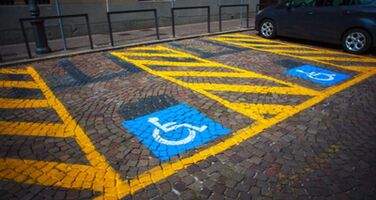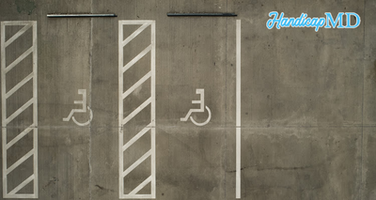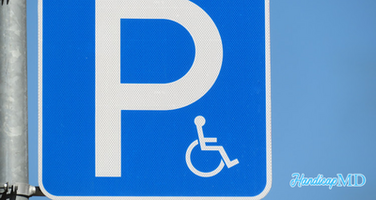
Disabled Parking Permit in Colorado Springs: How to Obtain and Use a Handicap Parking Permit
Disability tags play a critical role in enhancing mobility for individuals with disabilities. These tags ensure access to specially designated spaces, making it easier for people with mobility challenges to access essential services, businesses, and public facilities. If you’re considering applying for a disability tag in Colorado Springs, this guide provides everything you need to know about eligibility, application processes, and proper usage guidelines.
What is a Disabled Parking Permit?
A disability tag, also known as a handicapped placard or license plate, is a permit issued to individuals with qualifying disabilities. It provides access to designated accessible spaces, often located near entrances to buildings, businesses, and public facilities. These tags may be temporary or permanent, depending on the nature and duration of the disability.
By reserving spaces for those who genuinely need them, disability tags promote equality and convenience, ensuring that individuals with disabilities can lead more independent lives.
The Importance of Disabled Permits and Their Role in Enhancing Accessibility
Disability tags are more than a convenience; they are a cornerstone of accessibility. They enable individuals with physical challenges to participate in daily activities without the additional stress of navigating long distances or unsafe spots.
Key Roles of Disability Tags:
- Facilitating Mobility:
- Provide access to disability spaces located closer to building entrances, reducing physical strain.
- Promoting Safety:
- Minimize the risk of falls or injuries for individuals with limited mobility.
- Encouraging Inclusivity:
- Signal a commitment to creating an environment where everyone, regardless of physical ability, can thrive.
- Raising Awareness:
- Highlight the importance of accessible infrastructure in public and private spaces.
Disability tags are a visible reminder of society’s responsibility to ensure equitable access for all.
The Benefits of Obtaining One in Colorado Springs
City residents obtaining a handicap permit offers several practical advantages:
- Convenient Access:
- Reserved spaces near entrances make accessing businesses, medical facilities, and public spaces more manageable.
- Statewide and Nationwide Recognition:
- City or state issued disability tags are recognized across the United States, allowing consistent access to accessible spaces.
- Legal Protections:
- Ensure compliance with state and federal laws, protecting individuals from violations in designated spaces.
- Enhanced Quality of Life:
- By reducing barriers, disability tags empower individuals to engage more actively in community life and daily activities.
For individuals with disabilities, these benefits significantly improve mobility, safety, and independence.
Eligibility Criteria
To qualify for a disability tag in Colorado Springs, applicants must meet specific criteria established by the state Division of Motor Vehicles (DMV). Eligibility is determined based on the presence of a disability that limits mobility or requires the use of assistive devices.
Key Eligibility Criteria:
- Inability to Walk Long Distances:
- Difficulty walking 200 feet without stopping or assistance due to pain, fatigue, or breathlessness.
- Use of Mobility Aids:
- Dependence on devices such as wheelchairs, crutches, canes, or walkers.
- Respiratory Conditions:
- Severe lung disease or conditions that limit respiratory capacity.
- Cardiac Conditions:
- Heart conditions classified under the American Heart Association’s Class III or IV limitations.
- Vision Impairments:
- Legal blindness or other significant visual disabilities.
Applicants must provide certification from a licensed healthcare provider verifying their condition.
Common Medical Conditions and Examples
A variety of medical conditions may qualify individuals for a disability tag. Common examples include:
- Orthopedic Conditions: Severe arthritis, joint disorders, or limb amputations.
- Neurological Disorders: Multiple sclerosis, Parkinson’s disease, or stroke-related impairments.
- Respiratory Disorders: Chronic obstructive pulmonary disease (COPD), pulmonary fibrosis, or severe asthma.
- Cardiac Conditions: Congestive heart failure, coronary artery disease, or arrhythmias.
- Temporary Conditions: Post-surgical recovery from procedures such as knee or hip replacements.
Different Types of Disabled Permits Available in Colorado Springs
The city offers several types of disability tags to meet the needs of its residents:
Permanent Disability Tags:
- For individuals with permanent or long-term disabilities.
- Valid for up to three years and renewable.
Temporary Disability Tags:
- For temporary conditions, such as recovery from surgery or injury.
- Valid for up to 90 days, with the option to reapply if needed.
Disability License Plates:
- Permanent plates for vehicles owned or used primarily by the individual with a disability.
- Feature the International Symbol of Accessibility.
Disability Veteran Plates:
- For veterans with service-connected disabilities.
- May include additional benefits, such as fee exemptions.
Each type of tag has specific application and renewal requirements, ensuring that the system accommodates both temporary and long-term needs.
Step-by-Step Application Process for a Disabled Parking Permit in Colorado Springs
Obtaining a handicap placard in Colorado Springs is a straightforward process. Follow these steps to ensure a successful application:
- Download the Disabled Parking Privileges Application (Form DR 2219) from the state Division of Motor Vehicles (DMV) website, or pick up a copy at your local motor vehicle office.
Complete the Applicant Section:
- Fill out the form with your personal information, including your name, address, and contact details. Specify the type of disability tag you are applying for (temporary tag, permanent tag, or license plate).
- Have a licensed healthcare provider complete the medical certification section of the form. This verifies your eligibility based on qualifying medical conditions.
Submit the Application:
- Submit the completed form in person or by mail to the El Paso County Clerk and Recorder’s Office. Include any applicable fees (detailed below).
Receive Your Disability Tag:
- Upon approval, you will receive your disability tag or license plate. Temporary tags are typically issued on the spot, while permanent tags may be mailed to your address.
Benefits of Using HandicapMD.com for Online Applications
HandicapMD.com is a trusted resource designed to take the hassle out of applying for disability tags. Here are the key benefits of using this platform:
- Convenience: With HandicapMD.com, you can complete the entire process from the comfort of your home, avoiding the need for in-person visits to government offices.
- Time-Saving: The platform eliminates long wait times by allowing users to submit their application, upload documents, and check statuses online.
- Error Reduction: The system provides step-by-step instructions, ensuring applicants avoid common errors that can lead to delays or rejections.
- Comprehensive Support: If you encounter issues, HandicapMD.com offers responsive customer service to guide you through the process.
- Accessibility: Designed with user-friendly features, the platform is intuitive and inclusive, making it easier for individuals of all tech proficiency levels.
By leveraging HandicapMD.com, city residents gain access to a modern, efficient solution tailored to their needs.
Walkthrough of the HandicapMD.com Application Process
Applying for disability tags through HandicapMD.com is straightforward. Follow these simple steps to complete your application:
Create an Account: Start by registering on the website with basic personal information. This ensures your details are securely stored and accessible for future reference.
Upload Necessary Documentation: Gather the required documents, such as proof of disability from a licensed medical provider and identification. The platform allows you to upload scanned copies directly.
Complete the Online Form: Fill out the online application with details about your disability and vehicle. The form includes easy-to-understand prompts and dropdown menus to simplify the process.
Submit for Review: Once you’ve completed the form and uploaded all documents, submit your application. HandicapMD.com will review your submission for accuracy and compliance.
Track Your Application: After submission, you can log into your account to track the status of your application. Notifications will alert you to any required updates or when your tag is approved.
Receive Your Tags: Upon approval, your disability tags will be processed and sent to you, completing the process without any need for in-person visits.
Why Applying Online is the Best Option
Applying online through HandicapMD.com offers several advantages compared to traditional methods:
- Eliminates In-Person Barriers: Avoiding trips to government offices is especially valuable for those with mobility challenges or demanding schedules.
- Reduces Stress: The online process minimizes paperwork and streamlines communication, making it less overwhelming.
- Speeds Up Approval Times: Digital applications are typically processed faster than physical ones, allowing you to receive your disability tags sooner.
- Eco-Friendly: Online applications reduce the need for printed forms, contributing to environmental sustainability.
- Available 24/7: You can work on your application at any time that suits your schedule, offering unparalleled flexibility.
City residents embracing this online solution means a faster, more accessible way to secure disability tags, ultimately improving mobility and quality of life.
Fees
The costs for disability tags vary based on the type of tag:
Permanent Tags:
- Free of charge.
Temporary Tags:
- Free of charge.
Disability License Plates:
- Standard vehicle registration fees apply for license plates, but there are no additional charges for the disability designation.
Disability Veteran Plates:
- Veterans with service-connected disabilities may qualify for fee exemptions. Contact the state DMV or the local county clerk’s office for details.
Check with your local DMV office for the most up-to-date fee information.
Validity and Expiration
The validity period depends on the type issued:
Permanent Tags:
- Valid for three years. Expire on the last day of the month three years from the date of issuance.
Temporary Tags:
- Valid for up to 90 days. If additional time is needed, a new application with updated medical certification is required.
Disability License Plates:
- Valid as long as the vehicle registration is current, requiring annual renewal.
Monitoring the expiration date of your disability tag is essential to avoid penalties or interruptions in access to disabled parking.
Renewal Process
Renewing your disability tag is a simple process:
Permanent Tags:
- Renewals require completing a new application (Form DR 2219).
- Medical recertification may not be required for renewals unless there is a change in your disability status.
- Submit the renewal application in person or by mail to your local DMV office.
Temporary Tags:
- Submit a new application with updated medical certification to renew a temporary tag.
- Follow the same process as the initial application.
Disability License Plates:
- Renew your vehicle registration annually through the Colorado DMV. Ensure the disability designation remains listed on your registration.
Renewing on time ensures uninterrupted access to accessible privileges.
Replacing Lost, Stolen, or Damaged Handicap Permits in Colorado Springs
If your disability tag is lost, stolen, or damaged, follow these steps to request a replacement:
Complete a Replacement Form:
- Fill out a new application form (Form DR 2219) and indicate that you are requesting a replacement.
Provide Proof of Identity:
- Bring a valid photo ID when submitting your application.
Submit Your Request:
- Submit the completed form in person at the El Paso County Clerk and Recorder’s Office or your local DMV office.
Pay Any Applicable Fees:
- Replacement tags are typically issued at no charge, but standard registration fees may apply for replacement license plates.
Receive Your Replacement:
- Temporary tags are often replaced immediately, while replacement license plates may be mailed to your address.
How to Display Your Handicap Permit Correctly
Displaying your handicap placard properly is essential to ensure compliance with city regulations and to avoid fines. Here’s how to display it correctly:
For Placards:
- Hang the tag from the rearview mirror when parked in an accessible space.
- Ensure the tag is visible from outside the vehicle and not obstructed by tinted windows, items on the dashboard, or other obstructions.
- Remove the tag while driving to prevent it from blocking your view, as required by law.
For License Plates:
- Securely attach the disability license plate to the front and/or rear of the vehicle, as per the state's registration laws.
- Ensure the plate is clean and legible for proper identification.
Temporary Tags:
- Display temporary tags the same way as permanent ones, but pay attention to the expiration date. Expired tags are not valid.
Correct display ensures you can legally park in accessible spaces and helps maintain the integrity of the parking system.
Using Your Colorado Springs Disabled Permit in Other States
City-issued disability tags are recognized across the United States under the Americans with Disabilities Act (ADA). This nationwide validity allows individuals with disabilities to access accessible spaces in other states.
Key Considerations:
Nationwide Recognition:
- Your Colorado disability tag or license plate allows you to park in designated accessible spaces anywhere in the U.S.
Local Accessibility Regulations:
- States may have specific rules, such as time limits or additional requirements for using accessibility spots. Always check posted signs or local regulations when in another state.
International Travel:
- Disability tags are not universally recognized outside the U.S. If traveling internationally, consult the embassy or consulate of your destination country for information about accessibility accommodations.
By understanding these guidelines, you can use your disability tag with confidence when traveling.
Penalties for Misusing Accessible Parking Spaces
Accessible spaces are reserved for individuals with disabilities, and misuse disrupts access for those who genuinely need them. The city enforces strict penalties to ensure compliance.
Common Violations and Their Consequences:
Accessing a Disability Space Without a Valid Disability Tag:
- Staying in an accessible space without displaying a valid tag or license plate.
- Consequence: Fines ranging from $100 to $500, possible towing, and impound fees.
Using an Expired Tag:
- Continuing to use a disability tag or license plate after its expiration date.
- Consequence: Fines and revocation of accessibility privileges.
Misusing Someone Else’s Tag:
- Using a disability tag or plate issued to another individual.
- Consequence: Confiscation of the tag, fines, and potential criminal charges.
Blocking Access Aisles:
- Staying in the striped zones adjacent to accessible spaces, which are reserved for wheelchair ramps or mobility device access.
- Consequence: Fines and possible vehicle towing.
Proper use of disability tags and reporting misuse to local authorities helps maintain fairness and accessibility.
Common Myths and Misunderstandings About Handicap Permits
Disability tags are often misunderstood, leading to myths or misuse. Let’s dispel some common misconceptions:
Myth: Disability Tags Are Only for Wheelchair Users
- Fact: Tags are issued for various disabilities, including respiratory conditions, cardiac issues, and severe arthritis. Mobility aids are not the sole qualifying factor.
Myth: Disability Tags Allow Access Anywhere
- Fact: Disability tags grant access only to designated accessible spaces. Staying in fire lanes, no-parking zones, or private reserved spaces is still prohibited.
Myth: Anyone in the Vehicle Can Use the Tag
- Fact: Disability tags are issued to individuals, not vehicles. They can only be used when the person with the disability is present in the vehicle.
Myth: Temporary Disabilities Don’t Qualify
- Fact: Temporary disabilities, such as recovery from surgery, can qualify for temporary tags with proper medical certification.
Myth: Accessible Spaces Are Always Free
- Fact: While many accessible spaces are free, private lots and garages may charge standard fees for all users.
By understanding the facts and dispelling these myths, individuals can help promote responsible use and respect for disability tags.
What is Disabled Parking?
Disabled parking refers to reserved spaces designed to ensure easier access for individuals with mobility challenges. These spaces, marked with the International Symbol of Accessibility, are strategically located near building entrances, elevators, and ramps. Accessible space is an essential feature of public and private facilities, enabling individuals with disabilities to navigate spaces safely and independently.
Features of Designated Parking Spaces
Accessible spaces are thoughtfully designed to accommodate the needs of individuals with disabilities. Key features include:
Proximity to Entrances:
- Spaces are located close to entrances or pathways to minimize travel distances.
Wider Dimensions:
- Many spaces are larger than standard spots to allow room for wheelchairs, mobility aids, and vehicles with lifts or ramps.
Access Aisles:
- Striped zones adjacent to spaces provide additional room for wheelchair maneuvering and ramp deployment.
Van-Accessible Spaces:
- These spaces offer greater clearance and are specifically designed for vans equipped with lifts or ramps.
Clear Signage:
- Signs and pavement markings make these spaces easily identifiable and reserved for authorized users only.
These features collectively enhance accessibility and safety for individuals with disabilities.
Tips for Using Accessible Parking Responsibly
Accessible spaces are a limited resource, and responsible use ensures they remain available for those who need them. Follow these tips:
Use Only When Authorized:
- Park in accessible spaces only if you have a valid disability tag or license plate.
Display Your Tag Properly:
- Ensure your tag is clearly visible on the rearview mirror or dashboard while parked.
Avoid Blocking Access Aisles:
- Never park in the striped zones adjacent to accessible spaces, as these are critical for wheelchair users.
Adhere to Time Limits:
- If a space has a time restriction, respect the posted limits to allow others access.
Educate Yourself and Others:
- Share the importance of accessible spots and how misuse impacts individuals with disabilities.
By following these guidelines, you contribute to a more equitable parking system.
Encouraging Others to Follow Regulations
Promoting compliance with city regulations is a collective effort. Here’s how you can encourage others to follow the rules:
Raise Awareness:
- Educate others about the purpose of accessible spaces and the importance of adhering to regulations.
Set a Good Example:
- Use your disability tag responsibly and ensure it’s displayed correctly.
Speak Up When Necessary:
- If you witness someone misusing an accessible space, politely inform them of the rules or report the violation to local authorities.
Support Advocacy Efforts:
- Participate in community campaigns or initiatives that promote awareness of the city's regulations for accessible spaces.
Encouraging others to respect accessible spots helps maintain its availability for those who rely on it.
FAQs
1. Who qualifies for a disability tag?
- Individuals with conditions that limit mobility, require assistive devices, or impair vision may qualify. Certification from a licensed healthcare provider is required.
2. What types of disability tags are available?
- The city offers temporary and permanent tags, disability license plates, and special veteran plates.
3. How much do disability tags cost?
- Permanent and temporary tags are free, while standard registration fees apply to disability license plates.
4. Can I use my city-issued disability tag in other states?
- Yes, city-issued disability tags are valid nationwide under the Americans with Disabilities Act (ADA). However, always follow local parking regulations.
5. How do I replace a lost or stolen disability tag?
- Complete a replacement application form and submit it to the local DMV office. A nominal fee may apply for license plates.
6. What should I do if I see someone misusing an accessible space?
- Report the incident to local law enforcement or city enforcement authorities.
Conclusion
Disability tags are vital tools for fostering accessibility, independence, and inclusion in Colorado Springs. By understanding the features of accessible spaces, using them responsibly, and encouraging others to follow regulations, you help create a community that values equity and fairness. Whether you’re applying for a disability tag or educating yourself about its use, these efforts contribute to a more inclusive society.
Ready to apply for your disability tag? Visit HandicapMD.com for an easy, step-by-step application process. HandicapMD.com offers expert guidance, secure document submission, and fast approvals, ensuring you get your disability tag with ease. Start today and take the first step toward enhanced mobility and accessibility!
.png)






